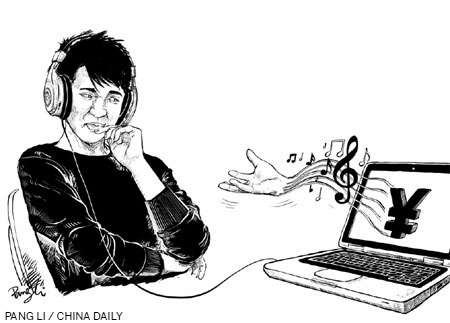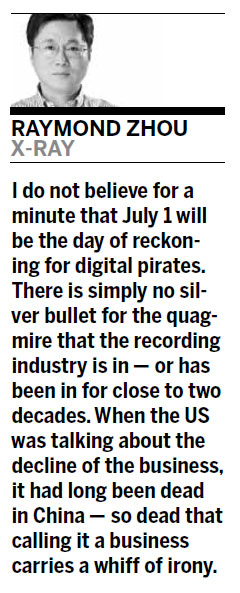Pay for free lunch
Updated: 2013-04-01 13:42
By Raymond Zhou (China Daily)
|
||||||||


The search for resurrection in the recording business is never-ending. But unlike movies, recorded music is easier to download and few mind the loss in sound quality. Worse, people are accustomed to getting it for free.
There have been rumblings in recent months that July 1 is to be the magical day that music distribution in China swerves from rampant piracy to law-abiding, fee-collecting happily-ever-after.
According to Gao Xiaosong, a noted musician, several forces are converging toward legal distribution of music in China. For one thing, many of the big record labels have reached an agreement to offer for-fee downloading, and to make it palatable they have lowered their asking price.
You cannot blame Gao for being a Pollyanna. The composer of many of the most popular tunes over the past two decades has been making a comfortable living - not from writing new hit songs, but from serving as a guest on TV talent shows and hosting an online talk show. Media reports mentioned he had tears in his eyes when he announced the date that musicians like him will be able to earn real money doing what they are supposed to do. "The day will finally come before I reach my retirement," he said.
I sincerely hope those tears of happiness do not turn into tears of bitterness.
I do not believe for a minute that July 1 will be the day of reckoning for digital pirates. There is simply no silver bullet for the quagmire that the recording industry is in - or has been in for close to two decades. When the US was talking about the decline of the business, it had long been dead in China - so dead that calling it a business carries a whiff of irony.
The demise of the music business, or more accurately the recording business, started with new technology. When a disc containing a collection of songs can be easily copied, without losing anything in quality, you know the legal operators are doomed.
When I first returned to China from the US in the late 1990s, I calculated that what I shelled out for one album in the States could get me as many as 28 in China. And the variety was bigger than that of a city library in the States. If you insist on buying legit, you have an extremely limited selection and the price is often higher than in the States.
Who could resist that kind of temptation? (If you adopt a purely cultural point of view, the availability of such a mammoth treasure-trove of music, of every imaginable genre, is like erecting millions of public libraries all across the country, removing a gigantic barrier for music appreciation, especially to those with little financial wherewithal.)
By the mid-2000s, most of the stores selling these discs were gone - the result of sporadic crackdowns and, more importantly, an even more efficient and "altruistic" way of illegal distribution. Music lovers tend to share what they like, and when they upload a song and an album to the Internet, it becomes available for anyone with a connection - and connections are getting faster by the day.
Now, music is not dead. It is alive and well. First of all, music, as conveyed on a compact disc, is going down the road of vinyl - as a niche product for a handful of collectors. I've seen people giving out elaborately packaged music discs and the recipients throw them into the trash can without evening opening them. They may put an equally expensive book on the bookshelf - not to read, but to decorate.
Music as ring tones enjoyed a brief moment of glory. It was reported that China Mobile alone rakes in some 30 billion yuan ($4.78 billion) a year from this business. The question is, how much of that is given to record companies and whether that's enough to sustain the future production of music? In China, the distribution platform usually controls all the power, essentially turning the production arm into slaves.
Some of the websites that offer free music pay a license fee to record labels. Sure, they sell ads on downloading pages, but music is used chiefly as an enticement for cyber surfers. It is this area that Gao Xiaosong was ecstatic about.
But is his optimism justified?
The reason people pay for certain things and not others is mostly conditioned by years of custom. Telecommunication companies charge for everything. They used to charge even for incoming calls. So, to sell a ring tone for a yuan or two is deemed acceptable. But websites have always offered free services. When they tried to upgrade users from free e-mail boxes to paid ones, most stayed away or migrated to other free sites.
It is hard, if not entirely impossible, for people to graduate from free to pay. Companies hand out lavish brochures and pamphlets to promote their merchandise. A sales brochure for a car or a house probably costs 10 yuan apiece, but nobody would dream of selling them. It's considered a necessary cost, which will be earned back thousands of times over when the car or house is sold. In a sense, recorded music, either streamed or on a disc, has morphed into the sales material.
The real product has shifted down the chain. Musicians still make money. They sell concerts and make commercial appearances. Singing one song may bring some of them revenues in the six figures. Emerging stars upload their new songs onto the Net in the hope of finding a wide audience. It is the record labels that are suffering. People who are not holding onto the old revenue model left long ago. Who'd want to be in a business of making sales brochures while being excluded from the business with commercial value?
Right now, the attention is on the fee-collecting process. Apple with its iTunes store has given hope to many. Of course, convenience and security of payment are important. So is reasonable pricing. The real difficulty is in the culture - habits nurtured through decades and accepted by a billion-plus people.
China has a musicians' association that collects royalties. The song Legend, one of the most popular in recent years, earned a total of 94.75 yuan in a year from the nation's karaoke segment. (And it's much easier to find a karaoke store in China than a public toilet.)
Liu Huan, the reigning king of pop music on the mainland, gets a royalty check that does not even meet the minimum wage of the capital city. That is equivalent to Michael Jackson earning $500 from his songs each month, and Thriller bringing him a whopping 100 bucks in a year. Sorry, I can't help being sarcastic.
I'm sure some users will gladly pay to download songs. The trick is, how much of the online population will change their habits to embrace this, and equally important, how much of that revenue will be funneled back to the recording industry, or what remains of it?
To restore commercial value to music in the digital form, piracy must be eradicated. One is organized piracy, which the government is obligated to aggressively prosecute - more aggressively than what's been done so far. The other is harder to root out because it is done on an individual basis and in the spirit of sharing. I can imagine the elimination of music sharing on portal sites, but how can you prevent it from popping up on private online groups?
Only when fighting piracy gets serious will alternative revenue models, such as monthly subscription, become genuinely feasible. Until then, Gao Xiaosong should probably keep up his gigs on TV shows.
Contact the writer at raymondzhou@chinadaily.com.cn.
(China Daily 03/30/2013 page11)

 In Photos: 7.0-magnitude quake hits Sichuan
In Photos: 7.0-magnitude quake hits Sichuan
 Li Na on Time cover, makes influential 100 list
Li Na on Time cover, makes influential 100 list
 FBI releases photos of 2 Boston bombings suspects
FBI releases photos of 2 Boston bombings suspects
 World's wackiest hairstyles
World's wackiest hairstyles
 Sandstorms strike Northwest China
Sandstorms strike Northwest China
 Never-seen photos of Madonna on display
Never-seen photos of Madonna on display
 H7N9 outbreak linked to waterfowl migration
H7N9 outbreak linked to waterfowl migration
 Dozens feared dead in Texas plant blast
Dozens feared dead in Texas plant blast
Most Viewed
Editor's Picks

|

|

|

|

|

|
Today's Top News
Live report: 7.0-magnitude quake hits Sichuan, heavy casualties feared
Boston suspect cornered on boat
Cross-talk artist helps to spread the word
'Green' awareness levels drop in Beijing
Palace Museum spruces up
First couple on Time's list of most influential
H7N9 flu transmission studied
Trading channels 'need to broaden'
US Weekly

|

|







